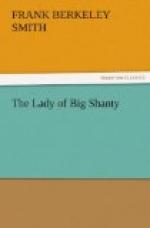That night after supper the four sat chatting within the glow of the stove, while the old dog lay asleep. Possibly it was the persuasion latent in a bottle of Thayor’s private reserve, that little by little coaxed the trapper into an unusually talkative mood, for until far into the night the man from the city lay on his back on the springy boughs, listening and smoking, keenly alive to every word the old man uttered.
“Most times now,” he went on, as he leaned forward and patted the dog, “I let the old dog have his way—don’t I, dog?—but then it warn’t a week ago that ‘twas t’other way. Me and him was follerin’ a buck on Bald Mountin, and he got set on goin’ by way of West Branch, ’stead of travellin’ a leetle mite to the south, what would have brung us aout, as I figger it, jest this side o’ Munsey’s. Wall, sir, arter we’d been a-travellin’ steady, say, for more’n four hours the old feller give in. Says he to me, ‘I’m beat,’ says he, julluk that, and he stopped and throwed up this gray snout of his’n to the wind and then he says, kinder ’shamed like, ‘I led ye off consid’ble, hain’t I?’ says he. I see he was feelin’ bad ’bout it, and I says, says I, ’It warn’t your fault,’ says I, ’we come such a piece; a dog’s jest as liable to be mistook as a humin’; and arter that it warn’t more’n an hour ’fore we was out to the big road and poundin’ for home. Thar, now”—here he pushed the old dog gently from him—“lie down and take another snooze; ye’re gittin’ so blamed lazy ain’t no comfort livin’ with ye.”
Thayor bent the closer to listen. Every moment brought some new sensation to his jaded nerves. This making a companion of a dog and endowing him with human qualities and speech was new to him.
The Clown now cut in: “And it beats all how ye kin understand him when he talks,” he laughed, too loyal to his friend to throw doubt on the old trapper’s veracity, “and yet it’s kind o’ cur’ous how a dog as old as him and that’s had as much experience as him kin git twisted julluk some pusillanimous idjit that ain’t never been off the poor-house road.”
Thayor laughed softly to himself, not daring to bring the dialogue to a close by an intervention of his own.
“Now, there’s Sam Pitkin’s woman,” the Clown continued with increased interest, “she’s jest the same way; hain’t never had no idee of whar a p’int lays; takes sorter spells and forgits which way’t is back to the house. Doc’ Rand see her last September when he come by with them new colts o’ his’n. ‘You’re beat aout,’ said he, ’and there ain’t no science kin cure ye. Ye won’t more’n pull aout till snow flies if ye don’t give aout ’fore that’—so he fixed up some physic for her and she give him a dollar and arter he tucked up the collar o’ that new sealskin coat o’ his’n and spoke kinder sharp to Sam’s boy what was holdin’ the colts, he laid them new yaller lines ’cross their slick backs and begun to talk to ’em: ‘Come, Flo! Come, Maudie!’ says he. ‘Git, gals!’ and he drawed the lines tight on ’em, and Sam’s boy says it jest seemed as if they sailed off in the air.”




